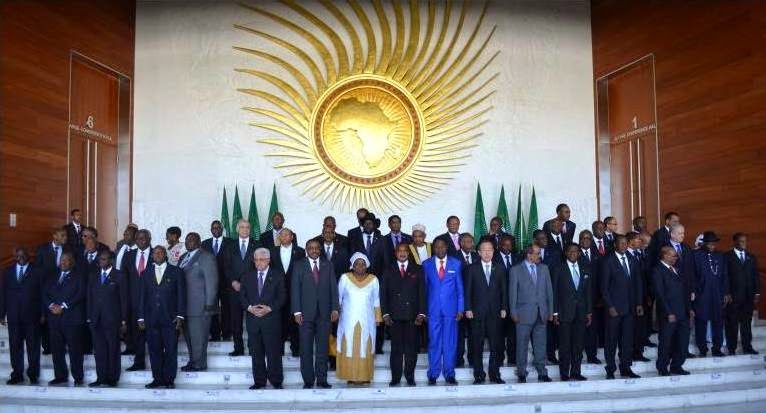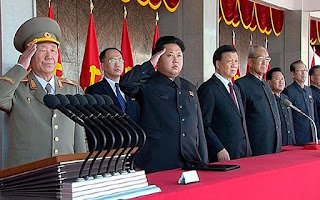The Unintended Consequences of the Isolationist Policy Initiatives of African Union Countries during the Ebola Outbreak
The
Unintended Consequences of the Isolationist Policy Initiatives of African Union
Countries during the Ebola Outbreak
By
E. Stanley Ukeni
It seems like the Ebola Virus Disease pandemic is
finally abating. This victory over this deadly disease is a victory for all
African on the continent, because the injury of one is supposed to be the hurt wound
of all Africans. Now, perhaps it’s time
to begin to reflect on some of the lessons to be learnt from the dreadful
outbreak.
I consider this pathogenic scourge to be the first
continental crisis of the twenty-first century, for Africa. In this crisis, I’m
sorry to observe that the collective leadership of Africa failed this critical
test of its singular will to present a unified front in tackling a formidable
problem that threated the wellbeing of its citizenry. To put it more
succinctly, it was a colossal failure in leadership. But, let’s not dwell in
the past. We must rather use the wisdom gained from how past events were
managed to prepare for future challenges. I am a firm believer that in other to
grow and evolve, we all have to be willing to learn from past mistakes and
missteps—our and those of others.
My focus with this discuss is on the panic reaction
by the governments of different African countries. In the face of a seeming
existential threat to the continent’s populace, the whole notion of unity and
shared resolve were reduced to mere rhetorical slogans. The leaderships of many
of the countries that constitute the African Union unilaterally decided to shut
their borders to the citizens of the other plague ridden countries. This
unfortunate move, though understandable, goes against the spirit of the notion
of a Union of States designed to advance common and shared interests and
objectives.
It is understandable that our survival instinct
generally compel us to react, often irrationally, when confronted with possible
existential threat. However, it has been proven true that that panic reaction
occasionally lead to unintended consequences which might further complicate the
initial situation that one was aiming to militate against.
Case in point, the panic reactions of various
African governments to restrict the free movement of people and commodities
from and to Ebola affected countries led an unintended inflationary price hikes
in the cost of such staple foods items as rice, cassava and maize in countries
where there are no know outbreaks of the Ebola Virus Disease, as restricted, or
outright ban no, cross border trades put supply pressure on staple food commodities.
A lack of cohesive management of the crisis by the leadership of the African
Union led to an undue economic hardship for the within the worst affected
countries and beyond.
Many who were already struggling to feed themselves
and their family, found it even more difficult to do so, at a time when their
bodies were already stressed by fear and tension. As hunger became a secondary
scourge in these effected countries, there was no concerted effort by the other
African Union countries to mobilize and deliver food items to the suffering
masses. The poor were left to fend for themselves at a time when most sources
of income dried up due to governments’ quarantine efforts. I dare to suggest
that, perhaps the reason that it was even more challenging to contain the
disease was because many, faced with the specter of starvation, decided to
break quarantine in other to find food for their dependents—as making it more
difficult to contain the epidemic.
This scenario played out over and over again in
Liberia, Sierra Leone, and Guinea—the three West African countries most affected
by the Ebola epidemic. For instant, it became evident, rather late, I think that
the hastily implemented restrictions placed on the movement of people—with the
aim of containing the spread of the Ebola scourge, equally prevented farmers
from securing the necessary labor force needed to harvest their crops at this crucial
harvest season. This undoubtedly negatively affected crop harvest—with the
labor intensive maize and rice harvests most affected.
Equally, the internal migration restrictions imposed
by governments within these three countries impeded the ability of subsistent farmers
and traders getting their meager food produce to markets where their
commodities are most in demand. We can imagine how their inability to trade
would adversely affect the already harsh economic situation of these small
scale farmers and trader.
Consequently, food prices began to spike as food
shortages begin to occur, and panic buying setting in. We saw this scenario
play out in the hard-hit Ebola epidemic zones. So, rather than focus primarily
on safe-guarding their loved ones from the dreaded Ebola pandemic, many choose
instead to focus their efforts in feeding their families. What occurred in the
three Ebola disease stricken regions could have quickly replicated in other
West African countries as the region’s food supply whittled, by thankfully it
did not occur. We all truly dodged the bullet there.
Some might read the preceding paragraph and consider
it alarmist. But I assure you that is not the case. If you recall, On Tuesday,
September 2nd, 2014, the United Nation’s Food and Agricultural
Organization (FAO) raised a special alarm that the Ebola outbreak was putting
food harvests in West Africa at serious risk—warning that the problem could
intensify in the coming months. The FAO also pointed out that, the price of
Cassava at a market in the Liberian capital Monrovia rose One hundred fifty
(150) percent in the first weeks of August, 2014.
The head of an FAO unit in Dakar, Senegal which is
coordinating the agency’s response to the food crisis, Vincent Martin, said in
a statement that, “Even prior to the Ebola outbreak, households in some of the
most affected areas were spending up to eighty (80) percent of their incomes on
food. Now these latest price hikes are effectively putting food completely out
of their reach.”
Sure the Ebola epidemic may have significantly
abated. But this is not the time to celebrate our triumph over this dreadful
epidemic. It time to think through how the Union of African States responded to
the Ebola pandemic. The leadership of African States—particularly, the
governments of West African countries, must look critically on their
implementation of isolationist polities, with the view of learning from past
mistakes. Diplomatic and policy differences must now be set aside, and trust
amongst African Union member States needs to be restored where they are damaged.
It is imperative now for African Union member States
to evolve transparent strategies for managing and responding to future
continental-wide crisis, so as to prevent an unintended consequence that would
have a far-reaching negative effect on the economies of the AU member countries.
The next continental-wide crisis of the twenty-first century might not be too
far off in the future. This is the time to prepare for it—whatever it might be.
Authored by E. Stanley Ukeni, ©2015. All Rights
Reserved.



Comments
Post a Comment